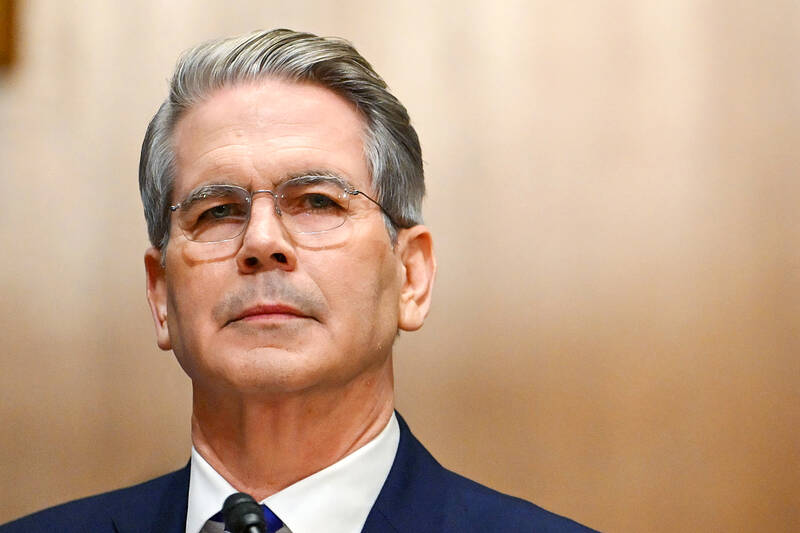The US Senate on Monday confirmed Scott Bessent to be US President Donald Trump’s Treasury secretary, giving the billionaire hedge fund manager a central role in shaping the new administration’s policy ambitions around tax cuts and spending and managing economic relationships with allies and adversaries alike.
As the 79th secretary of the Treasury, Bessent will have sway over the nation’s tax collections and its US$28 trillion Treasury debt market, with vast influence over fiscal policy, financial regulations, international sanctions and investments from overseas.
The vote was 68-29, with 16 Democrats supporting the nomination.

Photo: AFP
Bessent, 62, is already shaping up to be a forceful advocate for Trump’s economic agenda, which centers on reducing taxes and imposing steep tariffs that Democrats, and some economists, argue could undo some of the progress the US Federal Reserve has made in getting inflation under control.
In his confirmation hearing, Bessent warned that failure to renew US$4 trillion in tax cuts expiring at the end of this year would be a “calamity” for middle-class Americans, and made the case that tariffs would help combat unfair trade practices, increase revenues, and bolster US leverage in international negotiations.
He also pushed back against the idea that Trump’s policies would be inflationary, and said that the administration’s efforts to increase oil production would actually help bring down prices. As Trump’s top economic official, Bessent would face a range of challenges, the most immediate of which would be managing federal cash flows after the government hit its statutory debt limit on Trump’s second day in office. Even before he was sworn in, the US Department of the Treasury was using “extraordinary measures” to avoid breaching the cap and triggering a catastrophic default.
Bessent told senators in his confirmation hearing that there would be no default on his watch.
Bessent would also need to deal with the prospect of rising budget deficits and added government debt estimated to run into the trillions of dollars, if tax cut extensions and other promised tax breaks cannot be offset by revenue increases or spending cuts. If precedent holds, he will be a central actor working with Congress on the size and shape of any tax reforms.
Bessent used his confirmation hearing to talk tough on deficits, declaring that government spending is “out of control,” though it is not clear how much he could do to rein it in. He backed Trump’s pledge not to touch the Social Security retirement program and Medicare insurance plan for seniors, among the biggest line items in the federal budget, along with interest expense, determined by market rates that the Treasury does not control.

CAUTIOUS RECOVERY: While the manufacturing sector returned to growth amid the US-China trade truce, firms remain wary as uncertainty clouds the outlook, the CIER said The local manufacturing sector returned to expansion last month, as the official purchasing managers’ index (PMI) rose 2.1 points to 51.0, driven by a temporary easing in US-China trade tensions, the Chung-Hua Institution for Economic Research (CIER, 中華經濟研究院) said yesterday. The PMI gauges the health of the manufacturing industry, with readings above 50 indicating expansion and those below 50 signaling contraction. “Firms are not as pessimistic as they were in April, but they remain far from optimistic,” CIER president Lien Hsien-ming (連賢明) said at a news conference. The full impact of US tariff decisions is unlikely to become clear until later this month

Popular vape brands such as Geek Bar might get more expensive in the US — if you can find them at all. Shipments of vapes from China to the US ground to a near halt last month from a year ago, official data showed, hit by US President Donald Trump’s tariffs and a crackdown on unauthorized e-cigarettes in the world’s biggest market for smoking alternatives. That includes Geek Bar, a brand of flavored vapes that is not authorized to sell in the US, but which had been widely available due to porous import controls. One retailer, who asked not to be named, because

CHIP DUTIES: TSMC said it voiced its concerns to Washington about tariffs, telling the US commerce department that it wants ‘fair treatment’ to protect its competitiveness Taiwan Semiconductor Manufacturing Co (TSMC, 台積電) yesterday reiterated robust business prospects for this year as strong artificial intelligence (AI) chip demand from Nvidia Corp and other customers would absorb the impacts of US tariffs. “The impact of tariffs would be indirect, as the custom tax is the importers’ responsibility, not the exporters,” TSMC chairman and chief executive officer C.C. Wei (魏哲家) said at the chipmaker’s annual shareholders’ meeting in Hsinchu City. TSMC’s business could be affected if people become reluctant to buy electronics due to inflated prices, Wei said. In addition, the chipmaker has voiced its concern to the US Department of Commerce

STILL LOADED: Last year’s richest person, Quanta Computer Inc chairman Barry Lam, dropped to second place despite an 8 percent increase in his wealth to US$12.6 billion Staff writer, with CNA Daniel Tsai (蔡明忠) and Richard Tsai (蔡明興), the brothers who run Fubon Group (富邦集團), topped the Forbes list of Taiwan’s 50 richest people this year, released on Wednesday in New York. The magazine said that a stronger New Taiwan dollar pushed the combined wealth of Taiwan’s 50 richest people up 13 percent, from US$174 billion to US$197 billion, with 36 of the people on the list seeing their wealth increase. That came as Taiwan’s economy grew 4.6 percent last year, its fastest pace in three years, driven by the strong performance of the semiconductor industry, the magazine said. The Tsai